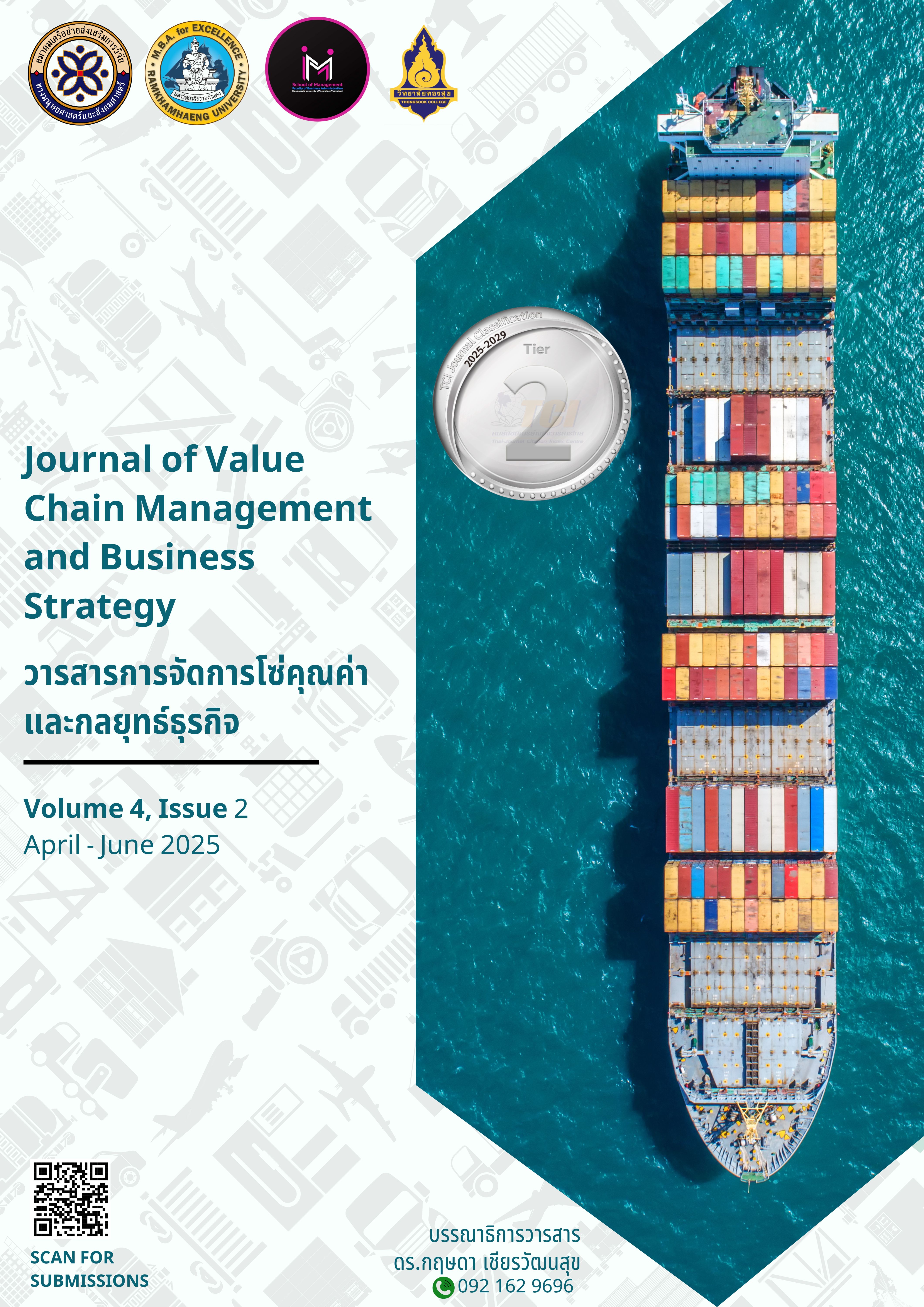LEADERSHIP AND WORK BEHAVIOR AFFECTING TEAMWORK EFFICIENCY OF STAFF IN THE CENTRAL DIVISION OF THE COOPERATIVE PROMOTION DEPARTMENT
Keywords:
Leadership, Work Behavior, Teamwork EfficiencyAbstract
The objectives of this research were to 1) study the personal factors of staff in the Central Division of the Cooperative Promotion Department; 2) examine the leadership qualities of supervisors in the Central Division of the Cooperative Promotion Department; 3) investigate the work behavior of staff in the Central Division of the Cooperative Promotion Department; and 4) assess the teamwork efficiency of staff in the Central Division of the Cooperative Promotion Department. The study sample comprised 230 staff members working in the Central Division of the Cooperative Promotion Department, selected through convenience sampling. Data were collected using questionnaires. The statistical methods used for data analysis included frequency, percentage, mean, standard deviation, t-test, one-way ANOVA, and multiple regression analysis.
The results of the study revealed that differences in teamwork performance depended on gender, marital status, job position, and years of service. Individuals with different gender, employment types, and monthly income had differing perceptions of their supervisors’ leadership. In addition, those with different ages, educational levels, and monthly income exhibited different work behaviors. Moreover, leadership characterized by idealized influence, intellectual stimulation, and individualized consideration affected teamwork performance. Similarly, work behaviors related to responsibility, cooperation, and consideration for others also contributed to effective teamwork performance.
References
กรมส่งเสริมสหกรณ์ กระทรวงเกษตรและสหกรณ์. (2567). รายงานประจำปี 2567. https://cpd.go.th/images2/2025/Annual_report_/Annual_report_2024.pdf
กองการเจ้าหน้าที่ กรมส่งเสริมสหกรณ์. (2567). ระบบสารสนเทศการรายงานผลข้อมูลบุคลากรของกรมส่งเสริมสหกรณ์. https://personnel.office.cpd.go.th/
ณัฐวุฒิ หาญสุวัฒน์. (2566, กุมภาพันธ์ 10). รู้จักกับ 5 กลุ่มพฤติกรรม Organizational Citizenship Behavior. Brightside People. https://brightsidepeople.com/รู้จักกับ-5-กลุ่มพฤติกรร/
ดวงนภา ไหมพรม, วิรัสพัชร วงษ์วัฒน์เกษม และสุวัฒนพงษ์ ร่มศรี (2565). ปัจจัยด้านภาวะผู้นำการเปลี่ยนแปลงของผู้บริหารที่มีผลต่อการปฏิบัติงานของบุคลากรวิทยาลัยเทคนิคบุรีรัมย์. วารสารสถาบันวิจัยและพัฒนา มหาวิทยาลัยราชภัฏมหาสารคาม, 9(2), 619–632.
ทัศนี ไชยจิตร, เจริญวิทย์ สมพงษ์ธรรม และชารี มณีศรี. (2564). การศึกษาภาวะผู้นำการเปลี่ยนแปลงของผู้บริหารที่ส่งผลต่อประสิทธิภาพการทำงานเป็นทีมของครูโรงเรียนในอำเภอน้ำยืน สังกัดสำนักงานเขตพื้นที่การศึกษาประถมศึกษาอุบลราชธานี เขต 5. วารสารนวัตกรรมการศึกษาและการวิจัย, 5(1), 103–119.
นุชจริน เสริมสวัสดิ์ และ อภิชาติ พานสุวรรณ. (2565). ประสิทธิภาพการทำงานเป็นทีมของบุคลากรสำนักงานอัยการในพื้นที่ จังหวัดพระนครศรีอยุธยา. วารสารมหาจุฬาวิชาการ, 10(1), 175–190.
ปรัชญาณี ศรีจอมขวัญ ลัสดายาวิละ และรัตนา สิทธิอ่วม. (2566). แรงจูงใจในการปฏิบัติงานและพฤติกรรมการเป็นสมาชิกที่ดีขององค์กรที่ส่งผลต่อประสิทธิภาพการปฏิบัติงานของศูนย์ไกล่เกลี่ยข้อพิพาทภาคประชาชนในเขตภาคเหนือ. วารสารการพัฒนาการเรียนรู้สมัยใหม่, 8(10), 141-152.
ปัญจรีย์ ศรีมุกข์ จุฑามุาศ มุวลทอง และจุรีีวรีรีณ จันพลา. (2564). พฤติกรรมการเป็นสมาชิกที่ดีและประสิทธิภาพในการทำงานของบุคลากรสำนักสรรพากรพื้นที่แห่งหนึ่ง. วารสารมหาวิทยาลัยศิลปากร, 41(1), 65-78.
ภูริวัชร์ ภู่ทองคำ. (2566). ประสิทธิภาพการทำงานเป็นทีมของกลุ่มคนเจนเนอร์เรชั่นวาย. วารสารการเมืองท้องถิ่นและนวัตกรรมการศึกษา, 2(2), 1-10.
ภูริส ภูมิประเทศ, ตรีชฎา สุขเกษม, อภิชาติ แสงอัมพร และภทพร ศรีโกตะเพขร. (2566). ภาวะผู้นำการเปลี่ยนแปลงของผู้นำองค์กรปกครองส่วนท้องถิ่นจังหวัดสุรินทร์ในศตวรรษที่ 21. วารสารมนุษยศาสตร์และสังคมศาสตร์ มหาวิทยาลัยราชภัฏสุรินทร์, 7(1), 124-144.
วรินทร์ธร ธรสารสมบัติ และ ฉวิวรรณ ปูรานิธี. (2567). วัฒนธรรมและประสิทธิผลขององค์การที่ส่งผลต่อการเป็นสมาชิกที่ดีของพนักงานมหาวิทยาลัยรัฐในจังหวัดกรุงเทพมหานคร. วารสารวิทยาการจัดการ มหาวิทยาลัยราชภัฏนครปฐม, 11(2), 150-169.
ศรัญญา ภูอาบทอง และ สมใจ ภูมิพันธุ์. (2564). ภาวะผู้นำการเปลี่ยนแปลงของผู้บริหารที่ส่งผลต่อประสิทธิภาพการทำงานเป็นทีมของสถานศึกษาเอกชนในจังหวัดร้อยเอ็ด. วารสารมนุษยศาสตร์และสังคมศาสตร์ มหาวิทยาลัยมหาสารคาม, 40(4), 98-109.
สันติ ชัยศรีสวัสดิ์สุข. (2566, มิถุนายน 20). ยอมรับการเปลี่ยนแปลงและปรับตัวเพื่อความยั่งยืน. ThaiPublica. https://thaipublica.org/2023/06/nida-sustainable-move38/
สุกัญญา มีสมบัติ และ กฤษดา เชียรวัฒนสุข. (2557). ภาวะผู้ตามและประสิทธิภาพทีมงานที่มีอิทธิพลต่อองค์กรแห่งการเรียนรู้ : กรณีศึกษากรมวิทยาศาสตร์การแพทย์กระทรวงสาธารณสุข [การค้นคว้าอิสระปริญญามหาบัณฑิต]. DSpace at Rajamangala University of Technology Thanyaburi. http://www.repository.rmutt.ac.th/handle/123456789/2644
Adams, J. S. (1965). Inequity in social exchange. In L. Berkowitz (Ed.), Advances in experimental social psychology (Vol. 2, pp. 267–299). Academic Press.
Bandura, A. (1977). Social learning theory. Prentice Hall.
Bass, B. M., & Avolio, B. J. (1994). Improving organizational effectiveness through transformational leadership. Sage Publications.
Eagly, A. H. (1987). Sex differences in social behavior: A social-role interpretation. Erlbaum.
Fiedler, F. E. (1967). A theory of leadership effectiveness. McGraw-Hill.
Kolb, D. A. (1984). Experiential learning: Experience as the source of learning and development. Prentice Hall.
Organ, D. W. (1988). Organizational citizenship behavior: The good soldier syndrome. Lexington Books/D. C. Heath and Com.
Parker, G. M. (1990). Team players and teamwork: The new competitive business strategy. Jossey-Bass.
Tuckman, B. W., & Jensen, M. A. C. (1977). Stages of small-group development revisited. Group & Organization Studies, 2(4), 419–427. https://doi.org/10.1177/105960117700200404
Yamane, T. (1973). Statistics: An introductory analysis (3rd ed.). Harper & Row.
Downloads
Published
How to Cite
Issue
Section
License
Copyright (c) 2025 Journal of Value Chain Management and Business Strategy

This work is licensed under a Creative Commons Attribution-NonCommercial-NoDerivatives 4.0 International License.




